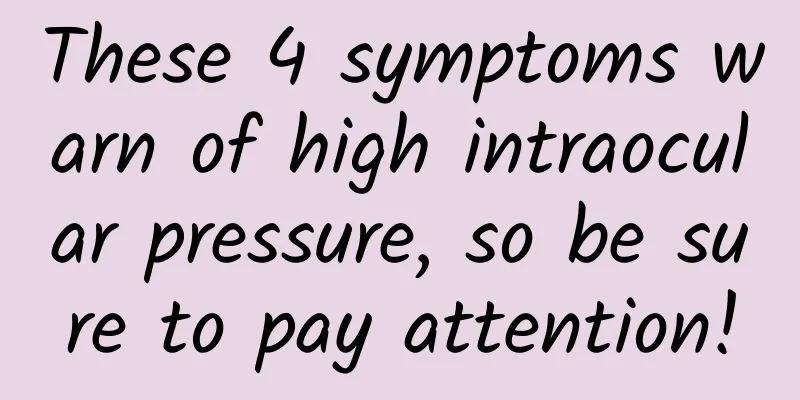These 4 symptoms warn of high intraocular pressure, so be sure to pay attention!

|
When people are under great pressure Eye pressure too? 1. Normal value of intraocular pressure Intraocular pressure is the pressure inside the eyeball. It is the balanced pressure exerted by the contents of the eye on the wall of the eyeball. The normal value of intraocular pressure for normal people is 10~21mmHg. IOP>24mmHg is high intraocular pressure, and IOP<8mmHg is low intraocular pressure. Too high or too low intraocular pressure will damage eye tissue and visual function to varying degrees, causing eye diseases such as glaucoma. An important part of the source of pressure inside the eyeball comes from the fluid in the eye - aqueous humor. Aqueous humor is secreted by the ciliary body, then flows from the posterior chamber of the eye through the pupil to the anterior chamber of the eye for discharge. This "in and out" process keeps the intraocular pressure within a stable range. 2. Causes of high intraocular pressure ①Disease factors Generally speaking, glaucoma, cataracts, iritis, diabetes, cerebrovascular disease and intraocular tumors may all cause increased intraocular pressure. ② Bad eye habits Long-term bad eye habits will prevent the eyes from getting a good rest and relaxation. Long-term eye fatigue and congestion may also lead to increased intraocular pressure and eye injuries. ③ Eye trauma often causes increased intraocular pressure. This is because contusion can cause congestion of the ciliary body's blood vessels, increasing the production of aqueous humor and causing increased intraocular pressure. ④ Congenital factors Congenital developmental problems, such as a small chamber angle, can lead to blockage of the aqueduct and obstruction of aqueous humor excretion. 3. The harm of high intraocular pressure ① Bloodshot eyes A sudden increase in intraocular pressure can cause hyperemia and dilation of the surface scleral blood vessels and conjunctival blood vessels. If high intraocular pressure persists for a long time, ciliary congestion will also occur. ②Narrowed field of vision and blurred vision When intraocular pressure is too high, it will damage the optic nerve, causing narrowing of the field of vision, blurred vision, etc. In the early stages, decreased vision and foggy vision often occur at night and disappear the next day after sleep and rest. ③Headache and eye swelling As the intraocular pressure increases, the peripheral nerve endings are stimulated, often resulting in migraine headaches and eye pain. The higher the intraocular pressure, the more obvious the headache and eye pain. ④ Rainbow Vision Due to the increase in intraocular pressure, there is a phenomenon of aperture when looking at lights. At the same time as the rainbow vision, there are also symptoms such as eye swelling, blurred vision, discomfort around the eyes, and headaches, which should be taken seriously. 4. How to relieve high intraocular pressure ①Keep a happy mood Emotional fluctuations and mental stimulation can easily increase intraocular pressure. Usually, you should keep a happy mood, don't get angry or anxious. ② Give your eyes enough rest Excessive use of the eyes will increase eye fatigue and lead to increased intraocular pressure. In daily life, it is not advisable to overuse the eyes for a long time, and you should pay attention to the combination of work and rest. ③ Voluntary eye movements You can relax your eye muscles through voluntary eye movements or eye exercises. ④Seek medical treatment promptly When intraocular pressure changes beyond a certain range, it is in a pathological state. It may cause headaches, red eyes, and in severe cases, nausea, vomiting and other symptoms. You should seek medical attention immediately. |
<<: 9 Things Cancer Cells Fear the Most, Be Sure to Do Them More Often! Save Them Now
>>: Talk about "Old Rotten Feet"
Recommend
Hangzhou reported that many primary school students tested positive for COVID-19! How to protect yourself during this period?
On February 19, according to Chao News and Zhejia...
What are the common foods for women to enlarge their breasts?
Breast enhancement has always been a topic of con...
Moderately differentiated squamous cell carcinoma of the cervix
Moderately differentiated squamous cell carcinoma...
Will I still have miscarriage after taking the pregnancy-preserving injection?
Women are very likely to have miscarriage in the ...
How to help mature follicles to be discharged
Mature follicles are a relatively normal situatio...
Which part of the pubic bone does pregnant women feel pain?
During pregnancy, as the fetus continues to grow ...
Ren Fazheng: The release of the new national standard for infant formula has attracted attention
Professor Ren Fazheng Academician of the Chinese ...
What happens if pregnant women drink coffee?
For some female friends who like to drink coffee,...
Can women take care of acne during menstruation?
Women usually develop acne due to the influence o...
What should you eat during the first week of pregnancy?
We all know that no matter whether the mother giv...
How long does it take for medical abortion to be effective?
Many people's ideas about sex life are becomi...
Can I take syrup during menstruation?
Syrup, as the name suggests, is a juice made from...
Fallopian tube insufflation procedure
Many women suffer from infertility due to blocked...
Leucorrhea WBC 3 Cleanliness 3
Gynecological B-ultrasound examination or dialysi...
Women can't sleep at night and urinate frequently
Many people have trouble sleeping at night, and a...









